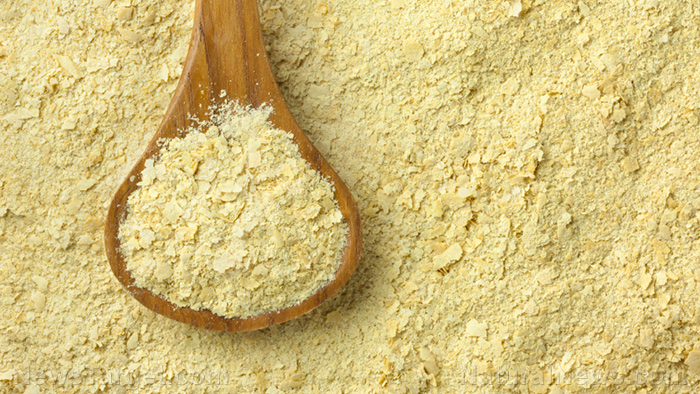
Advertisement
Nutritional yeast is inactive yeast made from beet molasses and sugarcane. This superfood can help improve your digestion and lower your blood pressure.
Nutritional yeast, also called “nooch,” is usually a strain of Saccharomyces cerevisiae. This species of yeast has yeast cells that use sugar for energy.
The nutritional profile of “nooch”
Vegans and vegetarians use nutritional yeast because it is rich in nutrients and B vitamins, but you can also add it to your diet if you are looking for a natural ingredient with a cheesy, nutty, and savory flavor. (Related: Nutritional yeast is an excellent vegetarian source of protein and B-vitamins.)
Because of its flavor profile, even non-vegans use it as a cheese substitute in dressing or sauces.
Nutritional yeast (about two tablespoons) is rich in vitamins B1, B2, B3, B6, and B12. It also contains folate and some vitamin B5. Nutritional yeast also contains fiber and protein, along with minerals like copper, iron, magnesium, manganese, and zinc.
Take note that only fortified nutritional yeast contains B vitamins. You can also buy unfortified yeast, but blending both fortified and unfortified nutritional yeast offers the best health benefits.
Unfortified yeast doesn’t have any added vitamins or minerals, but it has the vitamins and minerals that are naturally produced by the yeast cells as they grow. Meanwhile, fortified yeast contains synthetic vitamins that are added during the manufacturing process to boost nutrient content.
You can purchase nutritional yeast as flakes, granules, or powder in the spice section or bulk bins of health food stores. Additionally, nutritional yeast is naturally low in sodium and calories. It is also fat-free, gluten-free, sugar-free, and vegan. Properly stored, nutritional yeast can last up to two years.
Use nutritional yeast as a cheese substitute when making kale chips or pasta. Alternatively, you can combine nutritional yeast with cashews to make a creamy cheese sauce. In most recipes, the typical serving size for nutritional yeast is about one to six tablespoons.
Nutritional yeast is a complete protein source. It also has nine of the 18 amino acids that the body does not produce: histidine, isoleucine, leucine, lysine, methionine, phenylalanine, threonine, tryptophan and valine. This is another reason vegetarians and vegans use the ingredient — to get enough protein in their diet.
The health benefits of nutritional yeast
Here are five reasons to add nutritional yeast to your diet.
It boosts immunity.
Nutritional yeast’s antibacterial and antiviral properties can help fight E. coli (Escherichia coli), salmonella, and Staphylococcus infections. The yeast also contains immune-boosting compounds like beta-1,3 glucan, glutathione, mannan, and trehalose.
Alpha-mannan and beta-glucan can help fight infections by stimulating immune cells and preventing pathogenic bacteria from infecting the intestines. Nutritional yeast can also prevent nutrient deficiencies, which is crucial for tissue repair and wound healing.
It improves digestion.
Nutritional yeast can benefit individuals with poor appetite. It also has probiotics, which is good for people with diarrhea. Individuals with lactose intolerance can use nutritional yeast as an alternative for cheese or other dairy products.
According to research, S. cerevisiae expresses sucrase and isomaltase activity, but not lactase activity. This means that nutritional yeast can help address malabsorption in patients with sucrase-isomaltase deficiency who intentionally or unintentionally consume sucrose.
It is a vegan source of vitamin B12.
Vitamin B12 deficiency can cause symptoms such as chronic fatigue, depression, digestive problems (e.g., diarrhea and nausea), or poor memory. Since vitamin B12 is only found naturally in animal products, vegans and vegetarians can prevent a deficiency by consuming nutritional yeast.
Data from a 2000 study published in the journal Annals of Nutrition and Metabolism revealed that consuming at least a tablespoon of fortified nutritional yeast daily helped restore vitamin B12 levels in vegans who were deficient. In the study, researchers used nutritional yeast with five micrograms of vitamin B12 per tablespoon, which is more than double the recommended daily amount for adults.
It lowers cholesterol and blood pressure.
Nutritional yeast contains beta-glucan that can help lower both cholesterol and blood pressure. Data from an eight-week study revealed that men with high cholesterol who consumed 15 grams (g) of beta-glucan from yeast daily lowered their total cholesterol levels by at least six percent.
It promotes healthy hair, nails, and skin.
Nutritional yeast is full of B vitamins that promote healthy nails, hair, and skin. Vitamin B3 can address chronic acne and improve skin health. Additionally, the biotin and vitamin B5 in nutritional yeast is good for your nails, skin, and hair. They can also help reduce the signs of aging like skin spots and red skin.
Nutritional yeast is safe for consumption, as long as it is consumed moderately. An overdose of the yeast may cause symptoms such as uncomfortable facial flushing.
Do not consume nutritional yeast if you are allergic to yeast. If you don’t have a yeast allergy, try nutritional yeast in small amounts first to see how your body reacts.
Nutritional yeast does not cause candida yeast infections since completely deactivated and pasteurized nutritional yeast is safe to consume.
Add vegan nutritional yeast to your regular diet if you want to boost your intake of beneficial B vitamins.
Sources include:
Advertisements







